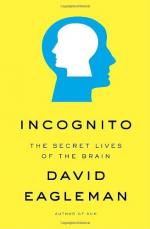
|
| Name: _________________________ | Period: ___________________ |
This test consists of 15 multiple choice questions and 5 short answer questions.
Multiple Choice Questions
1. How does Eagleton support his statement about what is or is not hard wired into our brains?
(a) He has the reader do an experiement on their own mind.
(b) He says he cannot support it since it is only theoretical.
(c) He provides several examples.
(d) He says the reader must take his word on it.
2. What disease does Eagleman mention in support of his argument about free will?
(a) Schizophrenia.
(b) OCD.
(c) Tourette's Syndrome.
(d) Autism.
3. Which actor does Eagleman discuss at the opening of this chapter?
(a) Brad Pitt.
(b) John Wayne.
(c) Mel Gibson.
(d) Jimmy Stewart.
4. What do some brain scientists propose?
(a) That computers can mimic the brain in all ways except fine discrimination.
(b) That the brain may work on numerous smaller routines.
(c) That the brain is not as much like a computer as originally thought.
(d) That the brain is able to handle much larger routines than computers.
5. What proved difficult in programming robots?
(a) Having them perform simple tasks.
(b) Having them perform two tasks that were only minutely different.
(c) Having them be able to grasp fine particles.
(d) Having them understand the difference between two degrees of moisture.
6. Who obtained a record of the arresting incident?
(a) The Hispanic-American Cultural League.
(b) A celebrity gossip website.
(c) The Anti-defamation League.
(d) The Chinese-American Relations Association.
7. What is the orbitofrontal cortex?
(a) The area of the brain that determines right or left handedness.
(b) The area of the brain affected by Alex's tumor.
(c) The area of the brain where the spinal column meets the brain tissue.
(d) The area of the brain that often determines psychosis.
8. What do we perceive about the limits of our conscious knowledge?
(a) We do not know what the limits of our conscious knowledge is.
(b) We know there are no limits but we often act as if there are.
(c) Our conscious mind in its egoistic state does not believe there are limits.
(d) We know there are limits but don't always recognize when we've reached one.
9. What did the group do with the arresting record?
(a) Made it public.
(b) Confronted the actor in person on live television.
(c) Bribed an officer to destroy the record.
(d) Tried to get rid of the record.
10. What is the significant fact in the two showings to the men?
(a) The men invariably chose the same in either situation.
(b) The men invariably chose differently in each situation.
(c) It has little to do with appearance, but more to do with the time they had to look at the pictures.
(d) The men seemed to randomly choose preferences no matter the amount of time exposed to the images.
11. From what does Eagleman say our ultimate behavior springs?
(a) As a result of the biological balance within our brain.
(b) As a result of our individual intelligence.
(c) As a result of values taught to us at a young age.
(d) As a result of the physical and emotional working in conjunction with each other.
12. What argument does Eagleman say he is not making?
(a) That every one must be absolutely accountable.
(b) That no one is responsible for his/her choices.
(c) That we should be working more towards gene manipulation.
(d) That those who have a genetic defect that affects their behavior should be more closely monitored.
13. Who is Charles Whitman?
(a) A mass murderer.
(b) A Professor at University of San Francisco.
(c) A cook at University of Texas.
(d) A small-time criminal.
14. What problem does Eagleman describe in illustrating how the mind may be divided?
(a) The problem of longitude.
(b) An early problem in the development of artificial intelligence.
(c) When developing the polygraph, how to distinguish between saying one thing and expressing something different with body language.
(d) Counting recurring numbers without missing one.
15. What does Eagleman think is a good model for how the brain works?
(a) A theory called particulate mentality.
(b) A concept call indiscriminate separation.
(c) A theory called science of mentality.
(d) A concept called society of mind.
Short Answer Questions
1. What does Eagleman say we are at the mercy of?
2. How do some scientist define intelligence?
3. How does Eagleman answer the question about whether the actor is racist or not?
4. How is the problem solved?
5. What is hard wired into our brains?
|
This section contains 819 words (approx. 3 pages at 300 words per page) |

|




